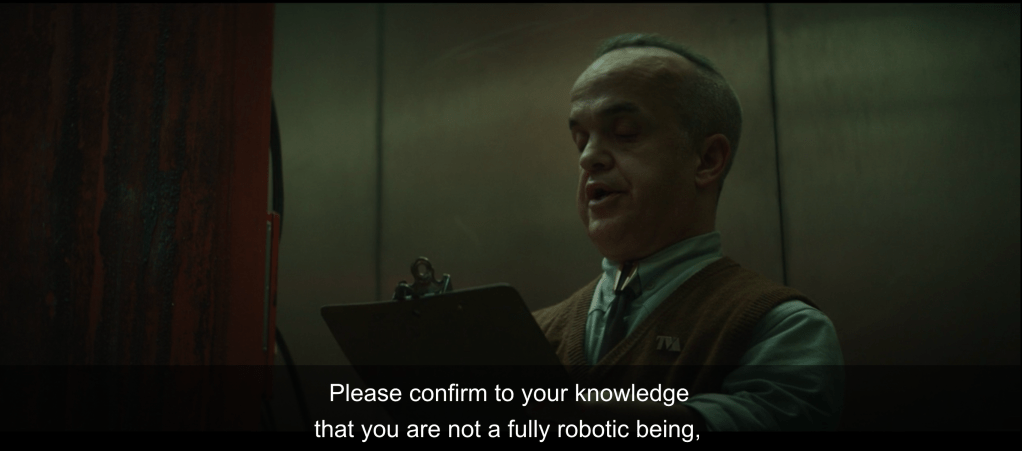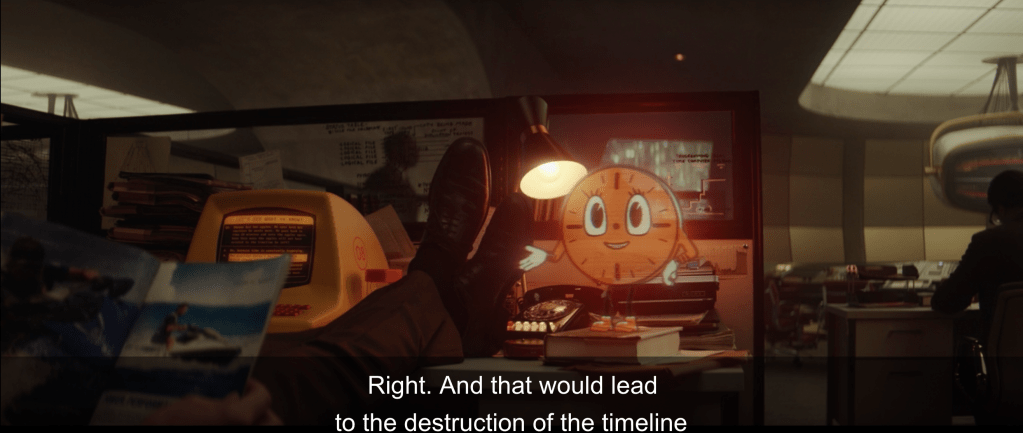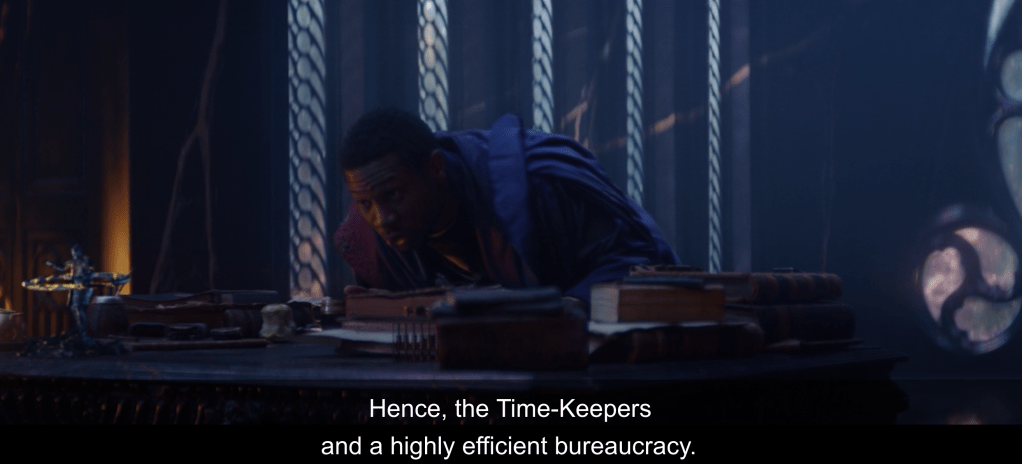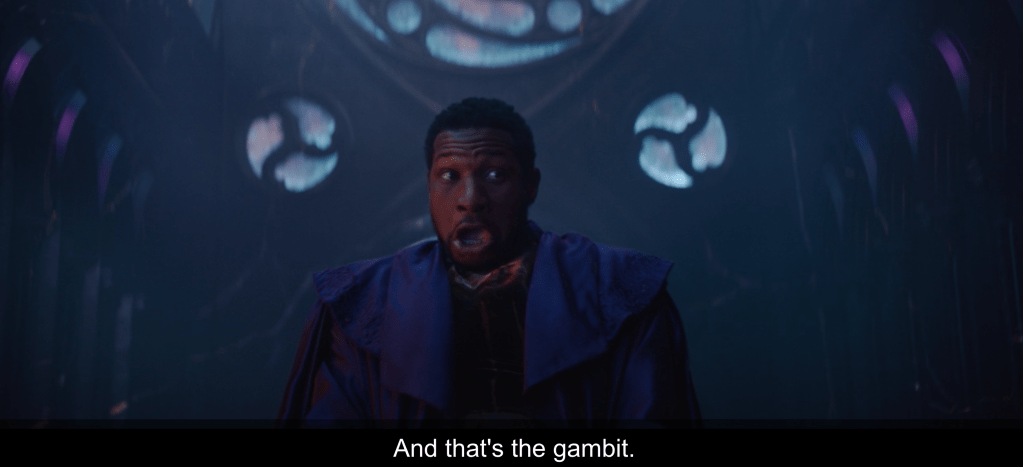By Emma Louise Backe
At the beginning of Marvel’s new Disney+ series Loki, the God of Mischief and Chaos is apprehended just as he’s escaped from the Avengers and obtained an Infinity Stone from a reconnaissance mission gone sideways (thanks Hulk). What would seem to be a moment of victory for Loki quickly turns into a bureaucratic nightmare as he’s dragged through a time-door, stripped into prisoner fatigues, and cycled through several desk officers asking him seemingly perfunctory, though nonetheless critical questions that will determine not only his innocence, but potentially even his survival. Do a lot of people not know if they’re robots? The purpose and power of this institution remains a mystery for the first half of Episode One: Glorious Purpose. The obfuscation and intentional refusal to disclose information, or explanation about the TVA or Time Variance Authority—Loki’s captors—functions similarly to story arc of Franz Kafka’s The Trial, in which the main character is arrested and put through a trial, all while unaware of what he’s being tried for, and therefore whether he’s actually innocent or guilty. Indeed, Loki’s charm and misdirection are utterly ineffectual within the TVA—the institution functions within its own logics and rules, a logic that seems simultaneously absurdist and awe-inspiring. As Loki attempts to escape his own trial and sentencing, he ends up in a cubicle complex, ultimately threatening a pencil pusher (Casey) into giving him back the Infinity Stone. Acquiescing, Casey opens a filing cabinet to reveal several scattered Infinity Stones, the objects that essentially drove the narrative of the latest phase of the Avengers movies. “We get a lot of those,” Casey explains, “Some of the guys actually use them as paperweights.” Stones capable of altering space and time, consigned to administrative baubles. In this moment, Loki finally starts to accept the seriousness of his captivity. “Is this the greatest power in the universe?” he asks, surrounded by ordinary workers filing papers and rubber stamping documents.

Among other things, Loki is a story about the hidden power of bureaucracy, bureaucracy’s capacity to conjure new realities through its administrative processes and even rewrite the flow of time through its minute, arcane, and often inaccessible managerial processes. The gambit of the TVA is organizing the “proper flow of time,” a temporal propriety allegedly overseen by the illustrious Time Keepers. Agents of the TVA—essentially time cops—are alerted to incidents when timelines start to “branch,” indicating variance in the “sacred timeline.” The TVA then intervenes to “prune” these variants and restore the “natural” flow of time. Initially Loki is skeptical of the sacrosanct way the TVA treats time—not only because the TVA’s very existence seems to undermine the possibility of free will, but also because their logic of what is permissible and what is criminal within the sacred timeline seems completely arbitrary. Poking fun at the “glorious purpose” of TVA agents like Mobius (played by Owen Wilson), Loki says, “The idea that your little club decides the fate of trillions of people across all of existence at the behest of three space lizards? Yes, it’s funny. It’s absurd.” Not even Mobius has access to the Time Keepers—there is no way of interrogating the logic of the Time Keepers’ decisions, and there is subsequently no accountability for the ways the Authority governs space and time. And yet employees like Mobius and Casey are completely dedicated to the mission of the TVA to maintain order within the universe—the ideology of the TVA allows for a Byzantine bureaucracy with the power to alter the course of history through the basic affordances of paperwork.
The importance of bureaucracy in temporal regulation is not necessarily new—there’s the Temps Commission in The Umbrella Academy, the Librarians in The Magicians, as well as Star Fleet’s attempt to intervene in the Temporal Wars of the 30th Century in Star Trek: Discovery. Even 12 Monkeys attempts to reshape the flow of time through carceral technologies and experiments on prisoners in exchange for shorter sentences. Damien Walter at The Guardian refers to the genre as “bureaumancy.” But what Loki emphasizes in particular are the ways that bureaucracies, through the performance of expertise, and its hegemony over the narrative of a sacred and singular timeline, have physical consequences on the lived realities of those regulated by these very bureaucracies. As David Mosse puts it in Cultivating Development, “What is usually more urgent and more practical is control over the interpretation of events” (2005, 8).
As a function of administration, and often statebuilding, bureaucracies construct organizational structures, filing systems, and forms of categorization which allow routine procedures to be carried out by officials often fulfilling a particular need or role. Ideally, a bureaucracy provides a structure of synthesizing information and systematizing the delivery of information, resources or services. However, modern bureaucracy is often typified by confusing and opaque paperwork processes; obscure systems by which applications or accounts are assessed; and a sense of frustration and anger at the pace and sometimes anachronistic logic of its procedures. In a COVID timeline, when so many had to navigate the complicated red tape of filing for unemployment, signing up for health insurance, tracking taxes for the stimulus check, and negotiating with landlords about rent relief, we’ve witnessed the failures of transparency in government or municipal bureaucracy, as well as the absurdism that often accompanies whether or not a claim is approved or not. There is an internal logic by which these bureaucracies operate that often doesn’t seem to make sense to those outside the system, and yet we have invested those systems with such enormous power that we have no choice but to submit ourselves to their rule.
This represents what Erica James refers to as bureaucraft, or a “process that emerges from the way opaque, bureaucratic technologies and practices resemble realms of ritual secrecy” (2010, 180). This “secret knowledge” (James 2010, 28) which one must know in order to navigate bureaucracy, functions as a kind of discourse or performance—I know more than you do. These bureaucracies can be well-intended, but, in their ability to construct administrative categories are then vested with the ability to transform or destroy a person’s livelihood. For instance, think about the way that diagnostic codes have been created by insurance companies. How a hospital or health care provider bills a doctor’s visit or medical procedure depends on these codes—a patient might either find themselves with massive unexpected medical bills, or a reasonable co-pay. These diagnostic codes can be manipulated by doctors—for better or worse, but in the social construction of these medical categories which are then made meaningful through health insurance administration, the world in which patients live is fundamentally reshaped.

We see this kind of disastrous manipulation adopted by the TVA, particularly in response to Loki variants. Loki is tasked with helping Mobius track down one of his variants, an individual who’s been abducting TVA agents and plotting to disrupt the sacred timeline. We learn that this variant—Sylvie—was abducted from her timeline when she was only a child. Although she was able to escape, she spent the rest of her life on the run, hiding out in Nexus events or pocket catastrophes, “at the end of a thousand worlds,” where she could avoid detection by the TVA. Needless to say, the TVA ruined any possibility of a “normal life” that Sylvie might have been able to have, hence driving her desire to overthrow the Time Keepers. We can even consider the disasters where Sylvie takes shelter—although the TVA doesn’t cause these world-destroying events, per se, they also refuse to intervene, essentially allowing for and propagating timelines—through their decision not to intervene—with hundreds, if not thousands, of life-altering catastrophes.
And yet when Sylvie asks what she did to be labeled a time criminal as a child, the TVA Judge tells her that she doesn’t remember. The administrative code which led Sylvie to be labeled a threatening “Variant” doesn’t matter, of so little consequence that it couldn’t even be consigned to memory. We could even ask whether this Variant characterization was made in categorical error. And yet whether or not the sacred timeline is objectively “true,” the discursive power of the TVA is such that their production of the truth takes on a real, material force through the social and political life of bureaucracy. In the words of Joo Dee (Avatar: The Last Airbender): “There is no war in Ba Sing Se.”
The fact that the TVA agents don’t remember when and why Sylvie was labeled a Variant is also emblematic of the more ominous ways that bureaucracies function. The confusing and intentionally convoluted way that bureaucracies operate can serve to shield those pushing paperwork from the outcomes of their administrative decisions, the devastating consequences of approving one application while rejecting another. Under the Trump administration, Hannah Arendt’s book Eichmann in Jerusalem: A Report on the Banality of Evil re-emerged as a popular analytic to understand why someone would work under a fascist system and consider themselves to be innocent of wrongdoing. Arendt’s term “the banality of evil” refers to the ways that Adolf Eichmann, an SS leader in Hitler’s Third Reich, carried out the paperwork necessary to remove hundreds of thousands of Jews from their homes, place them on trains, and transport them to concentration camps as part of Hitler’s “Final Solution.” The administrative nature of Eichmann’s role meant that he rarely had to confront the devastating impacts and human lives decimated by the “terribly normal” aspects of his job. Arendt argues that Eichmann was not “inherently” evil, but found purpose and prestige in the Third Reich, that Hitler offered him direction within the fascist apparatus he’d built. Arendt also goes to great lengths to describe the intentionally abstruse bureaucracy of the Third Reich, a hierarchical system that was difficult to map out, and often prevented officials in different positions of power from communicating with one another or sharing information. This was done intentionally because Hitler hoped that it would prevent possibilities of subterfuge or that he’d be co-opted by someone in his administration. For Arendt, bureaucratic dead-ends and a disconnect between the paperwork and its outcomes lies at the center of the design of the system, not as an unintended outcome of administration.

Anthropologists studying medical humanitarianism, international development, and global health have long pointed out the ways that government bureaucracies, aid apparatuses, and administrative platforms also shape people’s experiences of time (Brun 2016; McKay 2017; Redfield 2013). Susan Whyte (2013) discusses the projectified landscape of care for people living with HIV, the ways that anti-retroviral treatment (ART) adherence and donor demands in the global health sector require a kind of temporal discipline to the medication regimen, as well as a performance of wellness in the lifecycle of an HIV/AIDS development project. The paperwork associated with being a patient then creates a kind of contractual obligation to the time frames offered by this health project or intervention. Kelly Knight (2015), in her fieldwork among pregnant, drug-using women in San Francisco, discusses the often competing temporal regimens offered to pregnant, unhoused “addicts”—the amount of time they’re able to stay at an SRO (single room occupancy); the biomedical time of prenatal and antenatal care associated with pregnancy; as well as the time in treatment the state uses to judge matters of custody, jailtime and social security benefits. Each of these temporal regimes is assessed by bureaucratic institutions, and “neurocrats,” or advocates-cum-bureaucrats, who help women navigate the complicated demands of time offered by the state, Child Protection Services, the hospital, and the housing authorities. And yet each of these technocracies which operate through time change how these women live their day-to-day lives, how they experience time through the registers used to consider their health and capability as mothers. Each of these institutions adjudicate their own version of a sacred timeline, and as citizens or clients, we must adjust our sense of time and space accordingly.
In Loki, the interaction of fantastical magic and mundane bureaucracy would seem to work at odds with one another. But bureaucracy’s curious power to alter the course of time lends it a kind of occult persuasion—hence James’ blending of bureaucracy and witchcraft into bureaucraft. In a bureaucracy that seems to only make sense to a select few, and often only benefits those with connections on the inside, there can arise “suspicions of the hidden motives or practices of those perceived to have accumulated power or resources through occult means” (James 2010, 181). Indeed, despite modernity’s claims to eradicate any elements of magic, suspicion or the supernatural, anthropologists have also indicated the numerous ways that witchcrafts beliefs get folded into processes of modernity like development and democracy. In instances where some people have seemed to benefit more than others from post-colonial transitions of power and economic privilege; where some neighbors seem to accumulate money out of nowhere while others starve; where processes of liberal governance fail to act transparently, or state officials say one thing and do another, magic is a useful explanatory device (Ashforth 2005; Evans-Pritchard 1937; Geschiere 1997; Smith 2008). This is essentially the running joke in Welcome to Night Vale, a town with its own internal logic so arcane that the government is run by angels and hooded figures, neither of whom are ever available for comment. Indeed, this suspicion of government bureaucracy, international governing bodies, and security forces, the sentiment that something is not quite what is seems, lies at the heart of many contemporary conspiracy theories, like Q-Anon, which link politics and occultism.


The co-existence and intermingling of magic and everyday bureaucracy eventually leads Loki and Sylvie to “the end of time,” where they meet the official Time Keeper, “He Who Remains” (otherwise known as Kang the Conqueror). Kang is a glorified bureaucrat, organizing the flow of time to stave off a Multiverse War between his own Variants bent on destruction. In a long bit of dialogue and exposition, he admits that his “methods are deceptive” but asserts that his creation of the TVA, a “highly efficient bureaucracy,” created “ages and ages of cosmic harmony. And that’s the gambit. Stifling order or cataclysmic chaos” (Episode 6: For All Time, Always). But Kang is also talking to two deities of mischief and illusion. Loki and Sylvie can enchant, replicate and conjure objects out of nothing. Even though some of these illusions aren’t “real” in the traditional sense, they have a physical impact where they’ve been cast—a blade piercing flesh. So they understand and recognize a fellow conjurer when they see one.
Kang admits that he’s a dictator and a conqueror—“We’re all villains here,” gesturing at Loki and Sylvie’s own checkered pasts. Yet Sylvie takes it a step further, calling him a liar. The TVA bureaucracy was founded on Kang’s own idea of order, innocence and stability, a cosmic harmony which nonetheless, in the words of Sylvie “treated people’s lives like some kind of game” (Episode 6). Kang presents the false illusion of binaries—order or chaos, benevolent ruler or utter destruction. To rule not only the world, but also the Multi-Verse, relies on his ability to dictate the narrative of time through a bureaucratic system operating within its own tautological scheme, one in which the employees will carry out orders without question, and his divine power to dictate the past, present and the future is treated as dogma.
By introducing Kang as the new “big bad” in Phase 4, Marvel is continuing their tradition of pitting their heroes against arcane institutions wielding outsized power (Hydra, the Sokovia Accords, a corrupt criminal justice system). The enemy is no longer a purple Titan attempted to rebalance the finite resources of the universe—it’s the far more mundane project of book-keeping and administration, the silent but deadly paperwork that deems some innocent and some criminals of the sacred timeline. Both heroes and anti-heroes like Loki must face off against an occult bureaucracy slowly reshaping the matter of the universe before we even realize we’ve already been captured and pruned.

Works Cited
Ashforth, Adam. Witchcraft, Violence and Democracy in South Africa. Chicago: University of Chicago Press, 2005.
Brun, Cathrine. “There is no Future in Humanitarianism: Emergency, Temporality and Protracted Displacement.” History & Anthropology 27 (2016): 393-410.
Evans-Pritchard, E.E. Witchcraft, oracles and magic among the Azande. Oxford University Press, 1937.
Geschiere, Peter. The Modernity of Witchcraft: Politics and the Occult in Postcolonial Africa. Charlottesville: University of Virginia Press, 1997.
James, Erica Caple. Democratic Insecurities: Violence, Trauma and Intervention in Haiti. Berkeley: University of California Press, 2010.
Knight, Kelly Ray. addicted.pregnant.poor. Durham: Duke University Press, 2015.
McKay, Ramah. Medicine in the Meantime: The Work of Care in Mozambique. Durham: Duke University Press, 2017.
Mosse, David. Cultivating Development: An Ethnography of Aid Policy and Practice. London: Pluto Press, 2005.
Redfield, Peter. Life in Crisis: he Ethical Journey of Doctors Without Borders. Berkeley: University of California Press, 2013.
Smith, James Howard. Bewitching Development: Witchcraft and the Reinvention of Development in Neoliberal Kenya. Chicago: The University of Chicago Press, 2008.
Whyte, Susan Reynolds, Whyte, Michael A., Meinert, Lotte, and Jenipher Twebaze. “Therapeutic Clientship: Belonging in Uganda’s Projectified Landscape of AIDS Care.” In When People Come First: Critical Studies in Global Health, edited by João Biehl and Adriana Petryna (140-165). Princeton: Princeton University Press, 2013.





[…] Burdened with Glorious Purpose: Loki and the Hidden, Occult Power of Bureaucracy by Emma Louise Backe […]
LikeLike